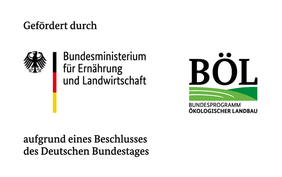"Social services of organic agriculture - how can they be recorded and who pays?" This was the title of the joint Bio-Fach congress contribution by the IfLS and the FibL and Thünen Institutes at BioFach in Nuremberg on 27 July. First, current research results of the ongoing BÖLN-funded projects regiosöl (IfLS) and UGÖ (FibL/Thünen) were presented. Afterwards, the actors on the podium discussed their understanding of social services provided by agriculture and called for more courage and political commitment to reward sustainable action. Participants were Dorle Gothe (Regionalwert AG Rheinland), Klaus Engemann (Biolandhof Engemann), Sigrid Griese (Bioland e. V. ), Dr. Nicolas Lampkin (Thünen Institute for Farm Management), Dr. Jürn Sanders (FiBL) and Simone Sterly (IfLS). Stefan Gothe (Regionalwert Impuls GmbH) moderated the event.
The event focused on the question of how ecological, social and regional economic services provided by farms can be recorded and remunerated in the future. Both BÖLN projects are driven by the observation that data for sustainability assessment is currently not available and new indicators need to be identified. After considering various sustainability tools, the regiosöl project identified the regional value sustainability and performance accounting as a suitable recording tool and surveyed 61 organic farms on their sustainability performance. The assessment criteria of the regional value performance calculation were supplemented by further factors in regiosöl. Simone Sterly emphasised the regional level as an important field of action, as the interaction of different farms forms an added value.
In the UGÖ project, the focus is on the recording of sustainability performance within the four protected goods of climate protection, biodiversity protection, soil protection and water protection. Speaker Nicolas Lampkin emphasised above all the result orientation, i.e. the choice of simple, effective methods in order to be able to carry out performance-differentiated remuneration in the future. Among other things, the more comprehensive evaluation of IACS data and the importance of a high proportion of clover grass in the crop rotation were mentioned.
The discussants were unanimous in their appeal to politicians not only to compensate costs for additional work, but also to provide incentives for a change in thinking on farms. Dr Jürn Sanders (FiBL) spoke of a "competition of ideas for the next CAP period" and called for more courage from policy-makers. They would have to find a way to reward farms for protecting public goods.
How these services can be strengthened through local networks is illustrated by the concept of Regionalwert stock corporations, which was presented by Dorle Gothe. The aim is to promote the links of a local value chain, i.e. regional producers, processors, bundlers and traders, to promote start-ups and to cultivate regional networks, while at the same time shareholders become beneficiaries of these resilient local structures.
In addition, Regionalwert AG Freiburg developed the regional value performance calculation in order to be able to communicate operational sustainability performance. Farmers can use an online tool to record their contribution to sustainability in the categories of ecology, social issues and regional economy. The result is a classification of how sustainably their farms are managed - and what the services are worth in euros and cents. In the Rhineland alone, it could be shown that sustainability services amounting to € 1.3 million are provided without remuneration on 25 farms.
As a practitioner, Klaus Engemann has a strong interest in being able to make visible why his organic products require higher prices from customers: "We have developed a price model with our supplying farms on the basis of the regional value-added calculation - and have also been able to agree on prices for special services in discussions with our customers. Dr. Nicolas Lampkin (Thünen Institute for Farm Management) countered that environmental services provided by organic farming benefit society as a whole. Therefore, it is not fair if only the buyers of organic food should pay for it. In future, there should be a basic premium for organic farms - plus payments for specific services to the climate, biodiversity, water or soil. "We are already getting started - as soon as the sustainability services of our farm are remunerated, I would like to invest more in training and pay more than the minimum wage," added Klaus Engemann.
Sigrid Griese (Bioland e. V.) emphasised the steering effect of the Common Agricultural Policy and pointed out that every euro that does not end up in sustainable agriculture supports non-sustainable agriculture: "If we want to promote organic, these farms must also receive more than conventional farms with individual measures. Individual farm decisions for sustainability have to be financed."
Simone Sterly (Institute for Rural Development) added: "Of course, the CAP is the big adjusting screw. But at the regional level there are other possibilities to find further, additional reward systems for farmers through regional actors." Dorle Gothe pointed out that the trade sector also has to take more responsibility for making sustainability services visible and remunerating them.
Contact at IfLS: Simone Sterly (sterly[at]ifls.de)
